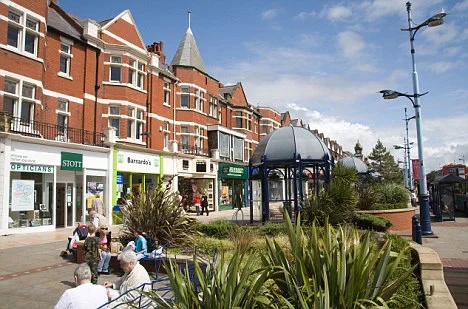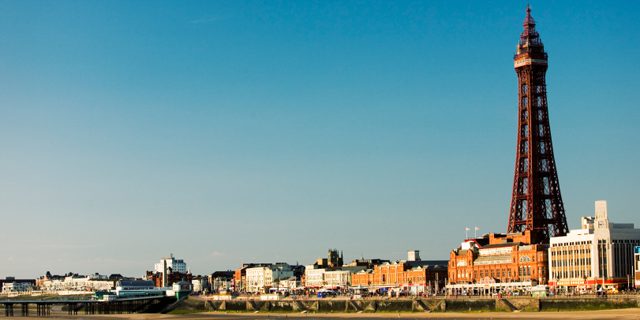A hundred years ago, perhaps even fifty years ago, a week in Blackpool (or Brighton / Great Yarmouth / Margate) was most people’s idea of paradise, with thousand of city folk flocking to the UK’s traditional holiday resorts every week throughout the summer season, in search of a little bit of sea, sun and fun.
Accommodation ranged from the bold and beautiful (Grand Hotel in Brighton) through to spare rooms in family homes and bunk houses in rear yards. The majority of course, were independent Guest Houses and small hotels, individually liveries along the seafront and adjacent roads. Marketing was virtually non-existent (in its current form anyway) with bookings renewed on an annual basis or by recommendation. Any spare capacity was simply advertised via a “Vacancies” window board, a reward for any last minute holiday maker, who chanced their luck and simply pounded these streets looking for a sign.
Current Situation:
But the Leisure industry has evolved. From package deals to Europe, Distant Shores, Disney & the US, Specialist Breaks, Holiday Parks, Private Rentals, Chalets & Cottages, Centre Parks …. the list goes on, but the result is that the previously dominant towns have a much smaller market and there has for many years been a massive oversupply of holiday accommodation.
As a result, margins have been reduced, profitability has all but dried up and the upkeep of properties has suffered. Whilst some of the smaller towns have transformed or progressed through other means – Brighton for example has two universities and, being one hour form London by train, is a perfect commuter town by the sea and Bournemouth has raised it game, with niche and boutique hotels – many have low employment, social problems and poor property stock.
Whilst the North South divide is no doubt apparent, we did look at two such Towns (Hastings and Blackpool) to establish if these same problems affected both and, in short they did. Whilst this is not a political of economic forum, we did do a little bit more digging and spoke to regional property investors to gauge their thoughts. An experienced property agent from the Blackpool area, who preferred not to named, thoughts give what we feel it a fairly credible explanation, which seems to be apparent to many such towns:
“The situation we are now faced with is the result of a number of factors and I can’t profess into being an expert at many of them, I just call it as I see it on the ground… Over the past twenty years, tourism has gradually deserted the town or rather evolved into a day-tripper or overnight (stag & hen nights for example) location. All the guesthouses could do was drop their prices as the local planning rules meant there was little else they could do with their properties. Those who did convert into flats / bedsits on a permanent basis did so unofficially and thus created poor quality and illegal stock, but what else were they to do?
Everyone got over excited about the super casino and the transformation of Blackpool into the UK’s Vegas, but that never came and the town continued to slide.”
To give some credit to the local authorities, they have in recent years adopted a number of plans to improve the town and its facilities, limiting the planning restrictions imposed on Guest Houses and Holiday Flats to just a few small and concentrated areas. Those areas outside of these zones can now be converted into permanent residential blocks, but they are restricting the number of smaller units (studios and one bed flats), thus ensuring that there is sufficient family accommodation. But is this enough?
For the past few years we have been monitoring the sale of a range of properties in Blackpool, which varies hugely on the basis of just a few streets or on whether or not the sale is of a distressed nature. Back to our man on the Ground…
“Two years ago, I had a look at a former hotel a stone’s throw from the Tower (Blackpool Tower – still one of the UKS’s leading attractions). With twenty en-suite rooms over four floors it was being sold by the receivers, at auction, with a guide of £125,000 plus. It wasn’t in bad condition and was bought just a few years earlier for £250,000. We could have easily got six or eight flats out of it, but it was in the ‘hotel zone’ and we’re not interested in holiday lets or running a guest house. It didn’t sell in the room and we were called the day after by the agents seeking best and final bids over £100,000. These prices (per square foot) are third world, but with the planning restrictions and cost of conversion, it just doesn’t make sense. We will probably be looking back in ten years saying ‘I could have bought that for … but for now, I just can’t work out a way to make them pay.”
Taking note of theses comments we did some further research and found scores of such properties, in Blackpool, Hastings and various other seaside towns. Pugh & Company, a leading auctioneer covering the Blackpool area has as many as six such properties in every sale and many sell for less than half of their values just a few years ago. In the next sale, they have a 30 bedroom hotel in need of refurbishment, guided at under £100,000 and another 29 Bedroom property, in good condition and with an indoor swimming pool / bar etc, guided at £175,000. Both of these are on the seafront, just minutes from the heart of the resort.
So is there a propportunity here? The truth is we don’t know. The current sale price for 1 and 2 bedroom flats in the area (between £50,000 and £90,000) indicates that, providing the property is outside of the protected zone and a change of use can be secured, a reasonable profit could be made. A longer term rental (and subsequent capital growth) is perhaps the more attractive option, but what could you make for them?
Project Analysis – 30 Bedroom (Blackpool) Hotel Conversion:
(Based on approximate costs and revenues only)
Purchase Price 125,000.00
Fees & Purchase Costs 25,000.00
Planning & Design 10,000.00
Refurbishment – Units (8) 96,000.00
Refurbishment – Building 75,000.00
Compliance Costs 20,000.00
Utilities & LA Costs 8,000.00
Contingency 25,000.00
Sales Costs 15,000.00
Total Project Expenditure 399,000.00
Finance Costs @ 7.5% 29,925.00
Total Cost: 428,925.00
Sales Revenue 560,000.00
Gross Return 131,075.00
Gross ROI 23.41%
Rental Value 48,000.00
Rental Costs @ 15% 7,200.00
Net Rental Yeild 40,800.00
Rental ROI 9.51%
The problem for Blackpool…
The problem for Blackpool is that there are much more attractive projects available to make the same or more money with a lot less hassle – and you don’t even need to travel to Brighton or Bournemouth to find them.

Lytham St Annes is just a few miles south of Blackpool and with its coffee bars and boutique hotels, is very much the Bournemouth of the North West. It’s actually two towns, being Lytham and St Annes on Sea (there are actually a couple more under the umbrella, but we won’t confuse things further), with Lytham the more expensive of the two.
During our research, we found a beautiful property (having just gone under offer) just a few minutes’ walk from the sea beach and Lytham centre. Currently divided into two flats, it required a full refurbishment, but at £275,000 it seemed a bargain – equivalent 5 bedroom houses in a neighbouring street are selling at between £550,000 and £600,000. Our summary of what you could expect to achieve is outlined below:
Project Analysis – 5 Bedroom (Lytham) House Conversion:
(Based on approximate costs and revenues only)
Purchase Price 275,000.00
Fees & Purchase Costs 10,000.00
Planning & Design 1,500.00
Refurbishment – Internals 75,000.00
Refurbishment – Externals 10,000.00
Compliance Costs 1,500.00
Utilities & LA Costs 1,500.00
Contingency 15,000.00
Sales Costs 5,000.00
Project Expenditure £394,500
Finance Costs @ 7.5% 29,587.50
Total Cost: 424,087.50
Sales Revenue 575,000.00
Gross Return 150,912.50
Gross ROI 26.25%
Rental Value 30,000.00
Rental Costs @ 15% 4,500.00
Nett Rental Yield 25,500.00
Rental ROI 6.01%
The above property went under offer within a week or so of coming onto the market. By contrast, the Blackpool hotels typically get marketed for a few months before being put into auction, often being sold at around the guide or even below it, post sale. This alone perhaps indicates where the smarter money is going – or simply where the costs, exit and returns are a little more certain.
The Propportunity:
Whilst we began this research looking for an answer to the unloved hotel stock currently filling up the coastal auction rooms, we found that the most attractive and lower risk deals are more often found in the more upmarket resorts. The old adage of Location, Location, Location, clearly rings true here and we feel that the uncertainties over planning (short term) and potential growth (longer term) of Blackpool and other traditional seaside resorts limit its attraction at this time.
However, there is no disputing the current purchase prices are cheap (perhaps too cheap) and if you have the means to invest £100,000 or so without any immediate return, the longer term uplift could well be significant. Alternatively, if you have the means and expertise to establish a purpose built vehicle with the resources to take on a number of properties in the short term, and with a willingness to work alongside the local authority to tackle the affordable housing issues if the town, this could well represent an excellent long term business propportunity.


